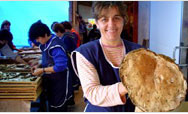You are here » Home » Telling Our Story
Success Story
Mandela Economics Scholars Program brings “brain gain” to South Africa
South Africa Develops World-Class Economists

| |
Photo: USAID/Reverie Zurba
|
|
Former South African President Nelson Mandela congratulates
economics scholars.
The $6.6-million scholarship program has helped 117 disadvantaged black South Africans complete advanced economics degrees.
|
Denied meaningful math and science education
throughout apartheid, few black South Africans had been able to earn degrees in economics by the mid-1990s. The shortage of black economists and local economics education
hobbled the country’s ability to plan and implement sound policies in its quest for economic reconstruction and development.
In an effort to reverse this problem, USAID created the Mandela Economics Scholars Program in 1996. Since then, the $6.6-million scholarship program has helped 117 disadvantaged
black South Africans complete advanced economics degrees at schools in South Africa and the United States.
The Mandela Scholars were so enthusiastic about the “brain gain” the program brought to South Africa that they formed the Mandela Economics Scholars Alumni Association in 2003. Geared to foster open debate on important economic issues in South Africa, the alumni association seeks to continue the work begun by USAID and, in the words of former South African President Nelson Mandela,
“open the way for many other students to follow in your footsteps.” The launch of the alumni association was the largest gathering of black economists in South Africa’s history.
The Mandela Scholars initially studied exclusively
at U.S. institutions, but the program shifted emphasis in 2001. It now assists South African universities in Cape Town, KwaZulu-Natal and Stellenbosch in upgrading their economics curricula to attract and train more qualified economists from disadvantaged
backgrounds.
More than 60 economists who graduated with help from the Mandela Economics Scholars Program now work at the highest levels of South Africa’s government — from the Office
of the President to the National Treasury. One Mandela Scholar went on to head South Africa’s delegation to the 2003 World Trade Organization meeting in Cancun, Mexico.
Lulu Dikweni, an economist at the Department of Transportation, who completed her Masters degree at Brandeis University in Massachusetts,
said, “The scholarships provided an invaluable opportunity for people from disadvantaged
communities to train in the field of economics and form a great resource alliance with fellow economists.” She said the launch of the alumni association served to “consolidate
this network so we can make a real difference in the country and to the economics profession as a whole.”
At the launch of the Alumni Association, South African Deputy Minister of Finance Mandisi Mpahlwa praised the program, saying, “May this association of alumni be a truly influential establishment that will take its rightful place in our quest for more constructive ideas, for more commitment, and for more unwavering dedication to the achievement of a society we can all be proud of.”
Print-friendly version of this page (383kb - PDF)
Click here for high-res photo
Back to Top ^ | 

